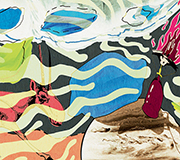
I was born and raised in Kalmykia, and this land, if you believe the old people (and not only them), is not quite ordinary. Many wonderful and incredible stories are told about our area. For example, there are frequent cases when a person who was going to get from one place to another wandered for hours. Or an equestrian teenager hurries with some errand to his father, to the shepherd's point, but suddenly flies out to a large group of people in ancient armour with ancient weapons that beckon him to them.
When I was the head of Kalmykia, almost squadrons of UFOs flew over Elista; we got so used to them that we stopped paying attention. And our leading newspaper had a special section of reports on incomprehensible events. This section has never disappeared from the pages: people always had something to share with readers.
Do not think that I am in a hurry to explain all these phenomena by supernatural reasons. The steppe is a complicated matter, it is not so easy for even an experienced person to navigate in it. For example, a man will leave for the steppe and disappear. How to explain this? Was it Shulma (evil spirits) that confused and led him to such a bad place? Scientists deal with UFOs in a following way: "The gas explosion on Jupiter was reflected from the clouds of Venus," or something like that.
On the other hand, it’s hardly that simple. Yes, the mentality of the Kalmyks is based on Buddhism, and this is a very mystic worldview. Our nomadic people are well enough aware of the treachery of the steppe to explain all accidents by the intervention of otherworldly forces. And can all the mysterious events really be explained scientifically?
Here is an example. In Kalmykia, quite a few - at least in their own words - have come across cases of foresight (in fact, the section in the newspaper that I mentioned consisted largely of reports on such cases). Moreover, I myself am no exception.
This is a well-known story: in August 1998, I was on a business trip in the Crimea. And suddenly I felt a vague but persistent anxiety: something big was coming, some economic disaster and it was necessary to somehow protect people. I called Elista and ordered to pay the people all pensions, all benefits to the penny. And on August 12, we did it. A week later, there was a default in Russia.
After that incident, I developed a reputation as a visionary. Until now, some believe that I went to the Bulgarian clairvoyant woman Vanga - with whom we were very friendly - either to study, or to exchange experiences. But this, of course, is far from the case.
My premonition did happen most likely because, as the head of the region, I received large amounts of information, and as a businessman, I could draw the right conclusions from it. Occupied with a regular work, I probably overlooked some warning signs. But the subconscious did not sleep and at some point, sent with a powerful, almost irresistible force a signal to the consciousness.
Vanga's foresight was of a completely different nature. When she predicted, she really went into some other reality. It could be seen and felt throughout. Physically she was there with her body next to us, but actually she was somewhere in a world unknown to us as far as her consciousness and her whole being was concerned.
Something similar can be found in the Apostle Paul's Second Epistle to the Corinthians, where he writes about a man, he knew who “was caught up to the third heaven (Whether it was in the body or out of the body I do not know—God knows)” and heard there “unspeakable words that a person cannot retell”.
You can habitually dismiss the testimony of the apostle: what can you expect from a story told two thousand years ago. Or you can begin to think about it.
I know that many are laughing: here, they say, Ilyumzhinov who was friends with Vanga, and flew with aliens, what can we expect from him? However, Newton compared himself to a little boy who plays on the shore of the endless ocean. He diverted himself in now and then finding a smoother pebble or a prettier shell than ordinary, whilst the great ocean of truth lay all undiscovered before him. Three centuries later, can we be sure that we have plunged into this ocean at least a little, and do not sit still on the shore, having fun with pebbles and shells?
It is not for nothing that many scientists believe that, relying on the so-called natural sciences and technical achievements, and declaring everything else insignificant and non-existent (since this “simply cannot be”), mankind has gone down a dead-end path of development. In doing so, we are like an athlete who trains one arm and one leg only. It would be a pitiful sight.
And after all, we should recall another Englishman, mathematician and logician Lewis Carroll, who urged people to practice believing impossible things. Remember his ‘sometimes I've believed as many as six impossible things before breakfast’?
Man, in my opinion, is a particle of the Cosmos. It is unlimited, which means that everything is possible in it. By refusing to acknowledge any part of it, we thereby limit ourselves. And is that wise?
























